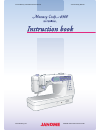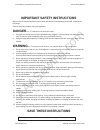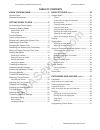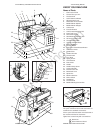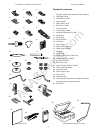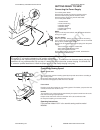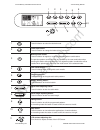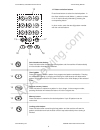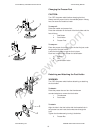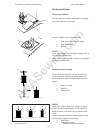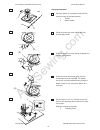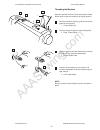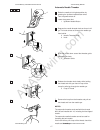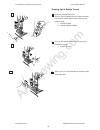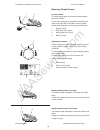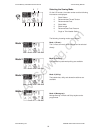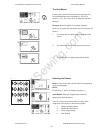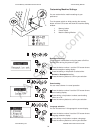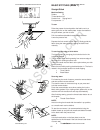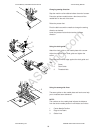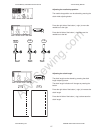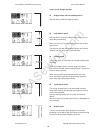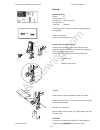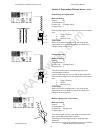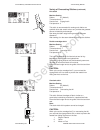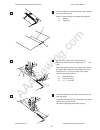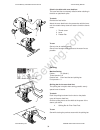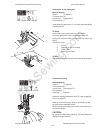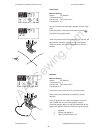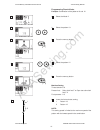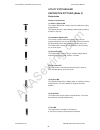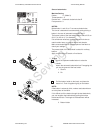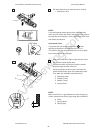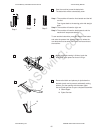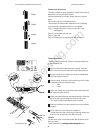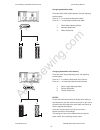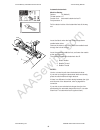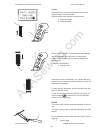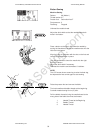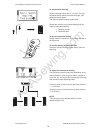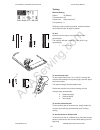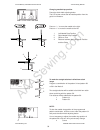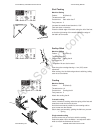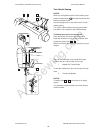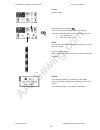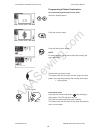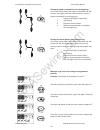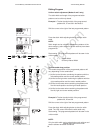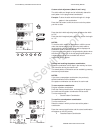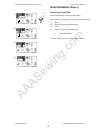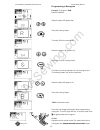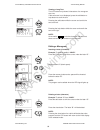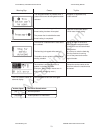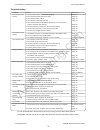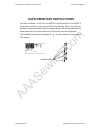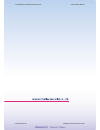- DL manuals
- Janome
- Sewing Machine
- Memory Craft 6500
- Instruction Book
Janome Memory Craft 6500 Instruction Book - Danger—
AAASewing.com
IMPORTANT SAFETY INSTRUCTIONS
When using an electrical appliance, basic safety precautions should always be followed, including the
followings:
Read all instructions before using this appliance.
DANGER—
To reduce the risk of electric shock:
1.
An appliance should never be left unattended when plugged in. Always unplug this sewing machine
from the electric outlet immediately after using and before cleaning.
2.
Always unplug before replacing a sewing machine bulb. Replace bulb with same type rated 12 Volts,
5 Watts.
WARNING—
To reduce the risk of burns, fire, electric shock, or injury to persons:
1.
Do not allow to be used as a toy. Close attention is necessary when this sewing machine is used by
or near children.
2.
Use this appliance only for its intended use as described in this owner’s manual.
Use only attachments recommended by the manufacturer as contained in this owner’s manual.
3.
Never operate this sewing machine if it has a damaged cord or plug, if it is not working properly, if it
has been dropped or damaged, or dropped into water.
Return this sewing machine to the nearest authorized dealers or service center for examination,
repair, electrical or mechanical adjustment.
4.
Never operate the appliance with any air opening blocked. Keep ventilation openings of this sewing
machine and foot controller free from accumulation of lint, dust and loose cloth.
5.
Never drop or insert any object into any opening.
6.
Do not use outdoors.
7.
Do not operate where aerosol (spray) products are being used or where oxygen is being
administered.
8.
To disconnect, turn all controls to the off (“O”) position, then remove plug from outlet.
9.
Do not unplug by pulling on cord. To unplug, grasp the plug, not the cord.
10. Keep fingers away from all moving parts. Special care is required around the sewing machine
needle.
11. Always use the proper needle plate. The wrong plate can cause the needle to break.
12. Do not use bent needles.
13. Do not pull or push fabric while stitching. It may deflect the needle causing it to break.
14. Switch this sewing machine off (“O”) when making any adjustment in the needle area, such as
threading the needle, changing the needle, threading the bobbin or changing the presser foot, and
the like.
15. Always unplug this sewing machine from the electrical outlet when removing covers, lubricating, or
when making any other adjustments mentioned in this owner’s manual.
SAVE THESE INSTRUCTIONS
The design and specifications are subject to change without a prior notice.
Janome Memory Craft 6500 Instruction Manual
Janome Sewing Machine
www.aaasewing.com
MC6500P Owners Manual/ User Guide
Summary of Memory Craft 6500
Page 1
Aaasewing.Com janome memory craft 6500 instruction manual janome sewing machine www.Aaasewing.Com mc6500p owners manual/ user guide.
Page 2: Danger—
Aaasewing.Com important safety instructions when using an electrical appliance, basic safety precautions should always be followed, including the followings: read all instructions before using this appliance. Danger— to reduce the risk of electric shock: 1. An appliance should never be left unattend...
Page 3
Aaasewing.Com 1 know your machine .................................. 3 name of parts ........................................................... 3 standard accessories ............................................... 4 getting ready to sew ............................. 5 connecting the power supply ....
Page 4
Aaasewing.Com 2 utility stitches and decorative stitches (mode 3) ................... 42 buttonholes ........................................................... 42 sensor buttonholes .................................................. 43 to sew ...........................................................
Page 5
Aaasewing.Com 3 know your machine name of parts 1. Foot pressure dial 2. Thread take-up lever 3. Thread guide 4. Quick reference board 5. Speed control lever 6. Retractable thread guide 7. Bobbin winder spindle 8. Bobbin winder stopper 9. Lcd screen 10. Function buttons 11. Lcd contrast adjusting di...
Page 6
Aaasewing.Com 4 1 2 3 4 5 6 7 8 9 12 11 10 13 14 15 16 17 18 20 19 21 22 23 24 26 25 27 28 30 29 standard accessories 1. Zigzag foot a (comes attached to the machine) 2. Overedge foot c 3. Rolled hem foot d 4. Zipper foot e 5. Satin stitch foot f 6. Blind hem foot g 7. Cording foot h 8. Overcasting ...
Page 7
Aaasewing.Com 5 getting ready to sew connecting the power supply turn off the power switch. Insert the foot control plug into the machine socket. Insert the machine plug into the machine socket. Insert the power supply plug into the wall outlet. Turn on the power switch. 1 power switch 2 foot contro...
Page 8
Aaasewing.Com 6 function buttons 1 thread cutter button press this button after finishing sewing and the machine will trim the threads. The led signal blinks while cutting the threads. 5 thread cutter signal notes: the auto thread cutter will work well with normal sewing threads #30 or finer. Use th...
Page 9
Aaasewing.Com 7 1 2 3 4 5 6 7 8 9 10 11 1 2 3 4 5 6 7 8 9 10 11 mode button: press this button to select the desired mode. Letter style button: press this button to change the letter style of monogram. Memory/recall button: press this button to register or recall programmed pattern combinations. The...
Page 10
Aaasewing.Com 8 13 14 15 16 17 12 13 14 15 16 17 12 pattern selection buttons press these buttons to select the desired pattern. In the direct selection mode (mode 1), patterns number 01 to 10 can be directly selected by pressing the corresponding button. In other modes, enter the two-digit pattern ...
Page 11
Aaasewing.Com 9 1 2 1 2 3 3 4 raising and lowering the presser foot the presser foot lifter raises and lowers the presser foot. You can raise the presser foot about 6 mm (1/4") higher than the normal up position by exerting more pressure when lifting the presser foot lifter. This allows for easy rem...
Page 12
Aaasewing.Com 10 changing the presser foot caution: turn off the power switch before changing the foot. Always use the proper foot for the selected pattern. Wrong foot can cause the needle to break. To snap off: raise the needle and presser foot. Press the red button on the back of the foot holder a...
Page 13
Aaasewing.Com 11 1 2 3 4 5 6 8 7 9 10 11 12 13 variety of presser feet and their uses 1 zigzag foot a: this is the most versatile foot. It can be used for various stitches including straight stitches and zigzag stitches. It is designed to achieve firm and neat seam results. 2 overedge foot c: this f...
Page 14
Aaasewing.Com 12 winding the bobbin removing the bobbin slide the hook cover plate release button to the right, and remove the hook cover plate. Lift out the bobbin from the bobbin holder. 1 hook cover plate release button 2 hook cover plate 3 bobbin notes: avoid using a bobbin when it begins to emp...
Page 15
Aaasewing.Com 13 winding the bobbin 1 pass the thread through the guide on the thread guide post from behind. 1 thread guide post 2 pass the thread under the bobbin winding tension disk. 2 bobbin winding tension disk 3 thread through the hole in the bobbin from the inside to the outside. 3 bobbin wi...
Page 16
Aaasewing.Com 14 inserting the bobbin 1 place the bobbin in the bobbin holder with the thread running off counterclockwise. 1 thread 2 bobbin holder 2 guide the thread into notch (a) on the front of the bobbin holder. 3 draw the thread to the left, sliding it between the tension spring blades. 4 con...
Page 17
Aaasewing.Com 15 4 threading the machine raise the presser foot lifter. Press the up/down needle button twice to raise the needle to its highest position. 1 pass the thread through the guide on the thread guide bar from behind. 1 thread guide bar 2 pass the thread through the right thread guide. 2 r...
Page 18
Aaasewing.Com 16 7 5 6 8 9 threading the machine (continued) 5 draw the thread down and around the tension dial from the right to the left. Pull the thread up to insert it between the tension disks and under the loop of the check spring. Be sure that the thread is coming out from notch of the disk. ...
Page 19
Aaasewing.Com 17 automatic needle threader 1 raise the needle to its highest position by pressing the up/down needle button twice. 2 turn the power switch off. 3 lower the presser foot. 1 up/down needle button 4 depress the needle threader knob as far as it will go. The hook comes out through the ne...
Page 20
Aaasewing.Com 18 drawing up the bobbin thread 1 raise the presser foot lifter. Hold the needle thread with your finger and press the up/down needle button twice to pick up the bobbin thread. 1 needle thread 2 needle up/down button 2 draw up the needle thread to bring up a loop of the bobbin thread. ...
Page 21
Aaasewing.Com 19 changing needles raise the needle by pressing the up/down needle button and lower the presser foot. Turn off the power switch. 1 loosen the needle clamp screw by turning it counterclockwise. Remove the needle from the clamp. 1 needle clamp screw 2 insert a new needle into the needle...
Page 22
Aaasewing.Com 20 3 2 1 4 7 3 2 1 4 balancing thread tension correct tension: the ideal straight stitch has threads locked between two layers of fabric. For an ideal zigzag stitch, the bobbin thread does not show on the right side of the fabric, and the needle thread shows slightly on the wrong side ...
Page 23
Aaasewing.Com 21 0 1 2 3 adjusting the foot pressure the foot pressure dial should be set at “3” for regular sewing. Reduce the pressure for appliqué, sewing on fine synthetics and elastic fabrics. Set the dial at “1” when sewing extra fine fabrics. 1 foot pressure dial 2 setting mark note: do not r...
Page 24
Aaasewing.Com 22 4 3 2 1 5 6 7 mode 1 selecting the sewing mode on the lcd screen, the mode number and the following information are displayed: 1 stitch pattern 2 recommended thread tension 3 recommended foot 4 stitch width 5 stitch length 6 recommended foot pressure 7 single or twin needle setting ...
Page 25
Aaasewing.Com 23 1 1 2 3 2 3 4 the help button pressing this button will show alternative applications of the selected pattern when the pattern 01, 08, 09, 10 (mode 1), or 01, 02, 03, 04, 05 or 22 (mode 3) has been selected. Example: when the pattern 01 has been selected. Each time you press the hel...
Page 26
Aaasewing.Com 24 customizing machine settings you can customize the machine settings to your preference. Turn the power switch on while pressing the memory button and the lcd screen will show the machine setting window. 1 memory button 2 power switch 3 machine setting window resumption setting the l...
Page 27
Aaasewing.Com 25 4 1 2 3 basic stitches (mode 1) straight stitch machine setting pattern: 01 thread tension:2-6 presser foot: zigzag foot a foot pressure: 3 to sew raise the presser foot and position the fabric next to a seam guide line on the needle plate. Lower the needle to the point where you wi...
Page 28
Aaasewing.Com 26 changing sewing direction: stop the machine a few stitches before the end of a seam. Press the up/down needle button a few times until the needle falls on the end of the seam. Raise the presser foot. Pivot the fabric around the needle to change the sewing direction as desired. Lower...
Page 29
Aaasewing.Com 27 1.0 5.0 7.0 3.5 0.0 adjusting the needle drop position the needle drop position can be altered by pressing the stitch width adjusting button. Press the right side of the button (+ sign) to move the needle bar to the right. Press the left side of the button (- sign) to move the needl...
Page 30
Aaasewing.Com 28 variety of the straight stitches 02 straight stitch with left needle position use this stitch to seam the edge of fabrics. 03 lock-a-matic stitch use this stitch to secure the beginning and the end of a seam with backstitching. When you reach the end of the seam, press the reverse b...
Page 31
Aaasewing.Com 29 basting machine setting pattern: 07 thread tension:1-3 presser foot: darning foot p-2 foot pressure: 1 feed dog: dropped the basting stitch is used to hold fabric layers together during fitting. Lower the feed dog set the foot pressure dial at “1”. Attaching the darning foot p-2 loo...
Page 32
Aaasewing.Com 30 1.0 5.0 2.0 7.0 zigzag stitch machine setting pattern: 08 thread tension:3-7 presser foot: zigzag foot a foot pressure: 3 zigzag stitch is used for various sewing needs including overcasting. It can be used on most woven fabrics. A dense zigzag stitch can also be used for appliqué. ...
Page 33
Aaasewing.Com 31 variety of overcasting stitches (modes 1 and 3) overcasting with zigzag stitch machine setting pattern: 08 thread tension:3-7 presser foot: overedge foot c foot pressure: 3 place the fabric edge next to the guide of the foot and then sew. 1 edge of fabrics 2 guide 3 wires on foot ca...
Page 34
Aaasewing.Com 32 variety of overcasting stitches (continued) knit stitch machine setting pattern: 01 (mode 3) thread tension:3-7 presser foot: zigzag foot a foot pressure: 3 this stitch is recommended for sewing such fabrics as synthetic knits and stretch velour as it provides the greatest amount of...
Page 35
Aaasewing.Com 33 zipper sewing machine setting pattern: 01 (mode 1) thread tension:2-6 presser foot: zipper foot e foot pressure: 3 to attach the zipper foot e fit the pin on zipper foot e to the groove on the foot holder. 1 groove 2 pin 3 to sew the left side of the zipper, attach zipper foot e wit...
Page 36
Aaasewing.Com 34 to sew 3 fold back the left seam allowance. Turn the right seam allowance under to form a 0.2 to 0.3 cm (1/8“) fold. Place the zipper teeth next to the fold and pin it in place. Set the stitch length and thread tension back to the original setting. 1 lower fabric 2 end of the openin...
Page 37
Aaasewing.Com 35 6 close the zipper and spread the fabric open flat with the right side facing up. Baste the opened fabric and zipper tape together. 11 basting 12 zipper tap 7 re-attach the zipper foot e with the left pin. Backstitch across the end of opening to 0.7 – 1 cm (3/8“). Stitch through the...
Page 38
Aaasewing.Com 36 rolled hem machine setting pattern: 01 (mode 1) thread tension:2-6 presser foot: rolled hem foot d foot pressure: 3 to sew: fold the edge of the fabric twice, 6 cm (2 3/8”) in length and 0.3 cm (1/8”) in width. Trim the corner 0.5 cm (3/16”) by 0.8 cm (1/4”) for easier insertion of ...
Page 39
Aaasewing.Com 37 patchwork and quilting (mode 2) patchwork angle scale on the needle plate you can easily seam patchwork pieces at the desired angles without marking, by using the unique angle scales on the needle plate. The angle scales are marked at 45, 60, 90 and 120 degrees. Seaming patchwork pi...
Page 40
Aaasewing.Com 38 stitch in the ditch with even feed foot the even feed foot is extremely effective when stitching in the ditch on patchwork quilts. To attach remove the foot holder. Attach the even feed foot to the presser bar with the lever over the needle clamp screw and secure it with the thumb s...
Page 41
Aaasewing.Com 39 quilting bar for the zigzag foot machine setting pattern: 01 (mode 1) thread tension:2-6 presser foot: zigzag foot a foot pressure: 2 reduce the foot pressure to “2” for better maneuverability of bulky material. To attach loosen the screw on the back of the foot holder. Insert the q...
Page 42
Aaasewing.Com 40 clasp stitch machine setting pattern: 70 (mode 2) thread tension:3-6 presser foot: satin stitch foot f foot pressure: 2-3 you can bind the thick quilt layers together with the clasp stitch. Select the pattern 70 and press the memory button . Press the locking stitch button. Lower th...
Page 43
Aaasewing.Com 41 programming french knots example: combination of the patterns 19 and 12. 1 select the mode 2. 2 select the pattern 19. 3 press the memory button. 4 select the pattern 12 5 press the memory button. Machine setting thread tension:5-8 presser foot: satin stitch foot f or open toe satin...
Page 44
Aaasewing.Com 42 16 17 13 15 14 utility stitches and decorative stitches (mode 3) buttonholes variety of buttonholes 11 sensor (square) bh this square buttonhole is widely used on medium to heavy weight fabrics. The buttonhole size is automatically determined by placing a button in the foot. 12 auto...
Page 45
Aaasewing.Com 43 sensor buttonholes machine setting pattern: 11 (mode 3) thread tension:1-5 presser foot: automatic buttonhole foot r foot pressure: 3 notes: buttonholes 11 and 13 to 17 are sensor buttonholes. The size of a buttonhole is automatically set by placing a button in the rear of automatic...
Page 46
Aaasewing.Com 44 3 pull the buttonhole lever down as far as it will go. 1 buttonhole lever note: if you start sewing without pulling down the buttonhole lever, the lcd screen will show a warning and the machine will stop after a few stitches. Pull the buttonhole lever down and restart the machine. A...
Page 47
Aaasewing.Com 45 5 start the machine to sew the buttonhole. The buttonhole will be automatically sewn. Step 1: the machine will sew the front bartack and the left row first. Then it goes back to the starting point with straight stitch. Step 2: the machine will sew the right row. Step 3: the machine ...
Page 48
Aaasewing.Com 46 double layer buttonhole to make a solid and sturdy buttonhole, sew another layer of buttonhole over the previous stitches. After the buttonhole is finished, simply start the machine again. Do not raise the foot or buttonhole lever. The machine will sew another buttonhole in the foll...
Page 49
Aaasewing.Com 47 changing buttonhole width press the stitch width adjusting button and the adjusting window opens. Press on “+“ to increase the buttonhole width. Press on “—“ to decrease the buttonhole width. 1 stitch width adjusting button 2 narrower buttonhole 3 wider buttonhole changing buttonhol...
Page 50
Aaasewing.Com 48 automatic buttonhole machine setting pattern: 12 (mode 3) thread tension:1-5 presser foot: automatic buttonhole foot r foot pressure: 3 pull the button holder of the buttonhole foot all the way out. Insert the fabric under the foot. Press the up/down needle button twice. Remove the ...
Page 51
Aaasewing.Com 49 to sew depress the foot control to sew the left side up to the required length of the buttonhole. Stop the machine and press the reverse button. 4 required length 5 reverse button start the machine again. The machine will automatically tack and sew down the right side of the buttonh...
Page 52
Aaasewing.Com 50 button sewing machine setting pattern: 08 (mode 1) thread tension:3-7 presser foot: satin stitch foot f foot pressure: 3 feed dog: dropped unthread the needle thread. Adjust the stitch width so that the needle enters both holes in the button. Place a button on the fabric and lower t...
Page 53
Aaasewing.Com 51 darning machine setting pattern: 18 (mode 3) thread tension:3-6 presser foot: automatic buttonhole foot r foot pressure: 3 pull the button holder to the rear. Place the garment under the foot. Press the up/down needle button twice. Remove the fabric to the left to draw both threads ...
Page 54
Aaasewing.Com 52 to sew a shorter darning to sew a darning shorter than 2 cm (3/4”), first stop the machine after sewing the required length, then press the reverse button. The required length has been determined. Restart the machine and continue sewing until the machine stops automatically. 1 requi...
Page 55
Aaasewing.Com 53 tacking machine setting pattern: 19 (mode 3) thread tension:3-6 presser foot: satin stitch foot f foot pressure: 3 tacking is used to reinforce pockets, crotches and belt carriers where extra strength is needed. To sew depress the foot control until the machine stops automatically. ...
Page 56
Aaasewing.Com 54 eyelet machine setting pattern: 20 (mode 3) thread tension:3-6 presser foot: satin stitch foot f foot pressure: 3 the eyelet is used for belt holes etc. To sew depress the foot control to sew. The machine will sew an eyelet and stop automatically when completed. Open the eyelet with...
Page 57
Aaasewing.Com 55 blind hem machine setting pattern: 04 or 05 (mode 3) thread tension:1-4 presser foot: blind hem foot g foot pressure: 3 select the pattern 04 for woven fabrics or pattern 05 for elastic fabrics. Note: the stitch width of the patterns 04 and 05 cannot be changed, but the needle drop ...
Page 58
Aaasewing.Com 56 changing needle drop position press the stitch width adjusting button. The lcd screen shows the left needle position from the guide in millimeters. Press on “—“ to move the needle to the right. Press on “+” to move the needle to the left. 1 left needle drop position 2 right needle d...
Page 59
Aaasewing.Com 57 shell tucking machine setting pattern: 06 (mode 3) thread tension:6-8 presser foot: satin stitch foot f foot pressure: 3 increase the needle thread tension to “6-8”. Fold and stitch on the bias. Place the folded edge of the fabric along the slit of the foot so that the right swing o...
Page 60
Aaasewing.Com 58 twin needle sewing notes: when you sew patterns with the twin needle, press the twin needle button and test the stitches first before you begin to sew. Use the zigzag foot a or satin stitch foot f for twin needle sewing. Turn off the machine before changing the needle. Use #60 or fi...
Page 61
Aaasewing.Com 59 to sew select a pattern. Press the twin needle button . The lcd screen shows a twin needle icon and the maximum permissible stitch width is restricted to 3.0 mm. 1 twin needle icon 2 maximum width (3.0) note: the maximum permissible stitch width is based on a 2 mm wide twin needle. ...
Page 62
Aaasewing.Com 60 programming a pattern combination one cycle sewing with the auto-lock stitch select the desired pattern. Press the memory button. Press the locking stitch button. Note: no further patterns can be memorized after pressing the auto-lock button. Depress the foot control to sew. The mac...
Page 63
Aaasewing.Com 61 pattern combination example: programming the patterns 23 and 25. Select the pattern 23 in the mode 3. Press memory button. Select the pattern 25. Press memory button. Note: set the thread tension at 1-4, foot pressure at 3 and use the satin stitch foot f when sewing the programmed p...
Page 64
Aaasewing.Com 62 elongation sewing patterns number 21-28 in the mode 3 can be elongated. Example: pattern 23 select the pattern 23. Press the elongation button. Elongation ratio is indicated in multiples of the original pattern length. Start to sew. Note: if you press the auto-lock button in the mid...
Page 65
Aaasewing.Com 63 sewing the pattern combination from the beginning if you have to stop sewing the pattern combination and wish to sew it over again, press the memory button to sew the pattern combination from the beginning. 1 programmed pattern combination 2 stop sewing. 3 press the memory button. 4...
Page 66
Aaasewing.Com 64 editing program uniform stitch adjustment (modes 2 and 3 only) the stitch width and length of the programmed stitch patterns can be uniformly altered. Example 1: to alter the stitch width of the programmed patterns 36, 37 and 36 in the mode 3. Shift the cursor to the right of the la...
Page 67
Aaasewing.Com 65 custom stitch adjustment (mode 2 and 3 only) the stitch width and length can be individually altered for each pattern in the programmed combination. Example: to alter the stitch width and length of a single pattern in the combination press the edit button to shift the cursor under t...
Page 68
Aaasewing.Com 66 monogramming (mode 4) selecting a letter style you can select block and script style letters. Press the letter style button to choose one of the following: (1) block (2) block (european accented letters) (3) script (4) script (european accented letters) 1 letter style button to sele...
Page 69
Aaasewing.Com 67 programming a monogram example: to program “r&b” select the mode 4. Select the letter “r” (pattern 28). Press the memory button. The letter “r” will be memorized. Select the pattern “&” (pattern 64). Press the turnover memory button. The letter size will be reduced to 2/3 of the ori...
Page 70
Aaasewing.Com 68 viewing a long text the lcd screen only shows 8 characters of a monogram at a time. If the entire text is not displayed, press the edit button or help button to scroll the text. Pressing the edit button shifts the cursor and scrolls the text to the left. Pressing the help button shi...
Page 71
Aaasewing.Com 69 care and maintenance correcting distorted stitch patterns the sewing results of the stitch patterns may vary depending upon the sewing conditions, such as sewing speed, type of the fabric, number of layers etc. Always test sew on a scrap piece of the fabric that you wish to use. If ...
Page 72
Aaasewing.Com 70 cleaning the hook race and feed dog warning: turn the power switch off and unplug the machine before cleaning. Note: do not dismantle the machine in any way other than what is explained on this page. 1 remove the needle and presser foot. Remove the setscrews and remove the needle pl...
Page 73
Aaasewing.Com 71 replacing the light bulb warning: turn the power off before replacing the light bulb. The bulb could be hot, wait until it has cooled down before touching it. To remove: remove the setscrew. Remove the faceplate. Swing the lamp socket to the left and pull out the bulb. To replace: i...
Page 74
Aaasewing.Com 72 the power is turned on without the foot control being connected. The foot control is disconnected while sewing. Connect the foot control and restart the machine. The power is turned on while depressing the foot control. Release the foot control. The power is turned on with the needl...
Page 75
Aaasewing.Com 73 the elongation button is pressed when a pattern that cannot be elongated has been selected. Elongation is applicable only to satin stitches. The power is turned on again after auto thread cutting has been interrupted. The presser foot is raised before auto thread cutting is complete...
Page 76
Aaasewing.Com 74 cause 1. The needle thread is not threaded properly. 2. The needle thread tension is too tight. 3. The needle is bent or blunt. 4. The needle is incorrectly inserted. 5. The needle thread and the bobbin thread are not set under the presser foot when start sewing. 6. The threads were...
Page 77: Supplementary Instructions
Aaasewing.Com supplementary instructions the stitch numbers 17 and 18 in the mode 2 and 58 and 59 in the mode 3 are extender stitches, they are not blind hem stitches. When one of these stitches is memorized after a stitch, straight stitches will be inserted after the memorized stitch so that the ba...
Page 78
Aaasewing.Com janome memory craft 6500 instruction manual janome sewing machine www.Aaasewing.Com mc6500p owners manual/ user guide.

